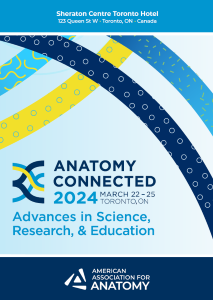Anatomy Education: Teaching Methods & Innovations Posters
Poster: Anatomy Education: Teaching Methods & Innovations Posters
140 - ORGAN-IZE: An Educational Card Game for Anatomy Students
Saturday, March 23, 2024
5:00pm - 7:00pm US EDT
Location: Sheraton Hall
Poster Board Number: 140
There are separate poster presentation times for odd and even posters.
Odd poster #s – first hour
Even poster #s – second hour
Co-authors:
There are separate poster presentation times for odd and even posters.
Odd poster #s – first hour
Even poster #s – second hour
Co-authors:
Raeesah Mohammed - McMaster University; Joseph Lawton - McMaster University; Jada Gibson - McMaster University; Bruce Wainman - McMaster University; Yasmeen Mezil - McMaster University
- AN
Aamna Naveed
McMaster University
Hamilton, Ontario, Canada
Presenting Author(s)
Abstract Body : Game-based learning (GBL) is emerging as a complementary learning method to traditional medical education. Gamification in this context involves the deliberate application of game elements and structure within a learning environment. Creating practical GBL tools for anatomy education holds the potential to improve medical student engagement, motivation, and performance. Given that medical students may feel overwhelmed by the content-heavy nature of anatomy, it stands to reason that this approach could address existing gaps in medical curricula. In this project, an educational card game intended to supplement renal anatomy education for medical students was developed based on this foundation. Undergraduate students in the Bachelor of Health Sciences program at McMaster University, along with faculty supervisors, and medical students, engaged in a collaborative co-design process through iterative cycles of designing and testing to develop ORGAN-IZE, a card game about renal anatomy. This game aims to teach the sequential structures involved in the renal filtration process. Each card in the deck features a simplified illustration of one of 11 connecting renal structures. The multiplayer game is played by stacking sequential cards, both proximally and distally. The gameplay offers opportunity for quick thinking, repetition, active recall, and active learning, contributing to the solidification of content knowledge. The feedback received from piloting this game indicates enjoyment and satisfaction, and there was interest from students to adapt ORGAN-IZE to the rules and formats of existing card games. A collaboration between the designer and medical students resulted in the finding that ORGAN-IZE cards were compatible with several other commonly played card games, including but not limited to Solitaire, Speed, and Spoons. Further feedback gathered in testing indicates satisfaction with the versatility of the cards and the range of competitiveness that the deck offers. Ongoing development involves expanding this format to design a series of card decks for additional body systems. Further effort is needed to gather more student perceptions and evaluations of the card game in a quantitative manner via post-gameplay surveys and questionnaires. Through this card game, GBL introduced an interactive and engaging approach for learning renal anatomy. These findings underscore the potential of developing GBL resources in medical education. This game was designed to complement and expand upon the current array of anatomy lab resources available through the Michael G. DeGroote School of Medicine at McMaster University.

